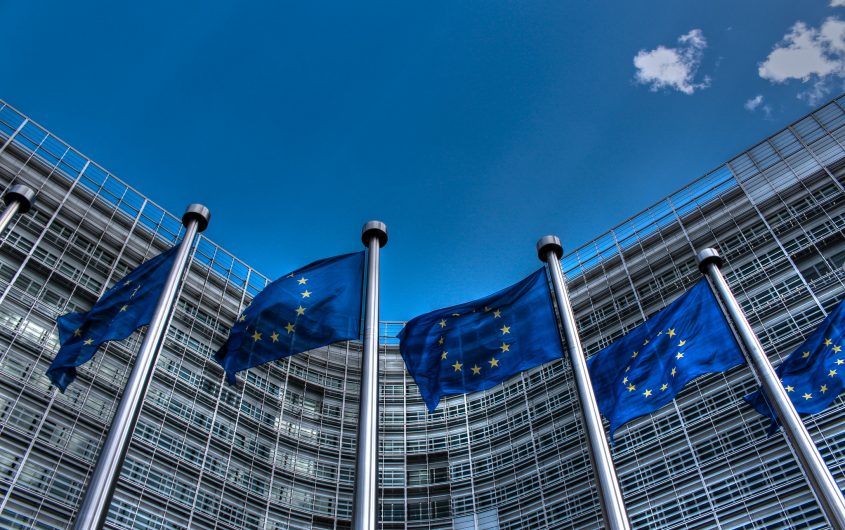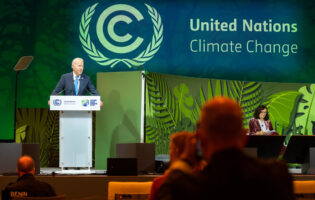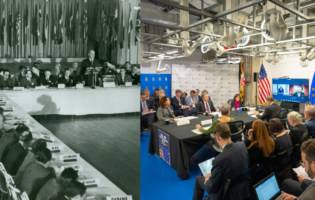
Thijs ter Haar via Flickr
The Franco-German Motor Turns 70

Peter S. Rashish
Vice President; Director, Geoeconomics Program
Peter S. Rashish, who counts over 25 years of experience counseling corporations, think tanks, foundations, and international organizations on transatlantic trade and economic strategy, is Vice President and Director of the Geoeconomics Program at AICGS. He also writes The Wider Atlantic blog.
Mr. Rashish has served as Vice President for Europe and Eurasia at the U.S. Chamber of Commerce, where he spearheaded the Chamber’s advocacy ahead of the launch of the Transatlantic Trade and Investment Partnership. Previously, Mr. Rashish was a Senior Advisor for Europe at McLarty Associates, and has held positions as Executive Vice President of the European Institute, on the Paris-based staff of the International Energy Agency, and as a consultant to the World Bank, the German Marshall Fund of the United States, the Atlantic Council, the Bertelsmann Foundation, and the United Nations Conference on Trade and Development.
Mr. Rashish has testified on the euro zone and U.S.-European economic relations before the House Financial Services Subcommittee on International Monetary Policy and Trade and the House Foreign Affairs Subcommittee on Europe and Eurasia and has advised three U.S. presidential campaigns. He is a member of the Board of Directors of the Jean Monnet Institute in Paris and a Senior Advisor to the European Policy Centre in Brussels. His commentaries have been published in The New York Times, the Financial Times, The Wall Street Journal, Foreign Policy, and The National Interest, and he has appeared on PBS, CNBC, CNN, and NPR.
He earned a BA from Harvard College and an M.Phil. in international relations from Oxford University. He speaks French, German, Italian, and Spanish.
__
“World peace cannot be safeguarded without the making of creative efforts proportionate to the dangers which threaten it.”
That is the first sentence of the Schuman Declaration, which 70 years ago tomorrow set in train the creation of the European Coal and Steel Community (ECSC), the foundation stone for today’s European Union. Penned by French foreign minister Robert Schuman, it set a high bar for judging the future success of efforts to forge greater European unity. Yet at the time—just five years after the end of World War II—his idea may have seemed self-evident. The lack of “creative efforts” during the inter-war years led to destruction and now had to be urgently summoned.
The ECSC launched Europe’s cooperation with the economy and with France and Germany at its center. By pooling the materials of war of the two former enemy nations, and expanding to include four other Western European states, this new enterprise would make conflict impossible at the heart of the continent. The failure four years later of the European Defense Community (also based on a Franco-German dynamic) reinforced the idea that a slower, economy-first approach would need to drive European integration rather than a top-down political process.
The failure four years later of the European Defense Community reinforced the idea that a slower, economy-first approach would need to drive European integration rather than a top-down political process.
Seventy years after Schuman’s innovation, the UK is leaving the EU, making the traditional Franco-German “motor” of progress that has driven successive integration efforts (above all the creation of the euro) more needed than ever to guide Europe’s future direction.
But the famed motor is sputtering. In part, that is because successive enlargements of the EU have reduced France and Germany’s combined weight. It is also because reunification has made Germany the largest EU member state by far, upending the balance between the two countries.
Equally responsible, however, is a difference in strategy.
French president Emmanuel Macron believes that the way to fight populism and nationalist anti-Europeanism is for the EU to shift to a top-down approach—to create new political, security, and financial institutions for the EU to protect its citizens from the challenges of globalization. Germany, led for the last fifteen years by Chancellor Angela Merkel, prefers more incremental steps to deeper cooperation. In that way, the government in Berlin may be more faithful to the spirit of the Schuman Declaration, which cautions “Europe will not be made all at once, or according to a single plan. It will be built through concrete achievements which first create a de facto solidarity.”
But what if the current extent of that solidarity has been underestimated? Whether it is the way German hospitals have taken in French coronavirus patients, or, more prosaically, the lengths to which German baguette lovers will go during a lockdown to get their daily bread from across the border in France, the pandemic may be revealing a sense of inter-connectedness that had remained less visible in normal times.
The pandemic may be revealing a sense of inter-connectedness that had remained less visible in normal times.
In the end, whether Schuman’s “de facto solidarity” has been achieved can only be determined by testing it. That entails risks, certainly. But especially if the stakes are high enough that the slow road could undo important EU achievements—the euro, for example—perhaps a more daring approach is justified.
How the EU’s leaders design a new recovery fund in the coming months to help the member states emerge from the economic effects of the pandemic will be one early test.








